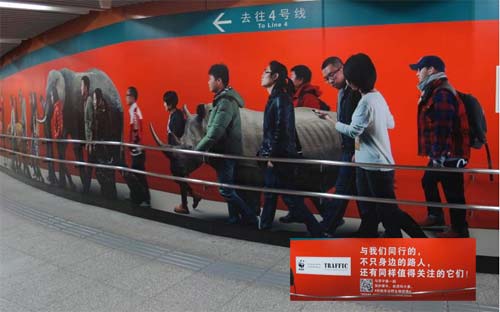Government, business and NGOs map strategies to reduce demand for illegal wildlife in China
Beijing, China, 7th February 2013—Various governmental, non-governmental and private sector organizations met last month in Beijing to agree how best to reduce the demand in China for illegal wildlife products.

Participants discussed the design and delivery of multi-targeted, multi-channel strategies to achieve demand reduction and also stressed the need for closer links between reducing demand with efforts to eliminate the supply of illegal wildlife products to markets in China.
The workshop, held on January 17th, was organized by the China Wildlife Conservation Association (CWCA), TRAFFIC and WWF, and included high- level representatives from China’s CITES Management Authority, State Forest Administration, General Administration of Customs, State Administration for Industry and Commerce, Supreme People's Court and Supreme People’s Procuratorate.
Also participating were representatives from China’s Auction Association, National Arts and Crafts Association, National Zoological Museum, Capital University of Economics and Business, the Chinese Academy of Sciences' Institute of Zoology, Taobao (a leading online shopping company) and the Wildlife Conservation Society (WCS).
Ogilvy Public Relations presented a study on luxury consumer behaviour. Working groups were established during the meeting specifically to discuss “Politics and Law Enforcement” and “Public Awareness Education”.
Participants noted the current spotlight focusing on wildlife crime in China and how government and the media needed to align with non-governmental organizations and the private sector in their efforts to address the issue.
It was also recognized that wildlife populations are facing increasing stress from rising demand for wildlife products—for use as food, medicine and luxury goods—and that there was an urgent need for greater research and understanding of these patterns of demand-driven consumption.
The workshop participants concluded that there is a keen need to understand the attitudes and motivations that drive consumers to buy these products, such as individuals’ need to highlight social status and personal success, and corporate gifting.
The workshop recommended that efforts to reduce the demand for illegal wildlife products be closely linked with efforts to combat illegal supply to the market, stressing the need for effective law enforcement and strengthening joint cooperation between law enforcement agencies.
The workshop also recommended outreach efforts to increase the awareness of Chinese nationals in Africa with respect to laws and regulations governing trade of wildlife products from Africa, and the restrictions on import of endangered species products to China.
The workshop recommended effective targeting of different consumer groups, using a variety of approaches, messages and communication channels by which to influence their behaviour and demand for illegal wildlife products.
Dr Shi Jianbin, Head of TRAFFIC’s China Programme, welcomed the progress made at the workshop and the agreement on the need for strategic approaches to address the complex challenges of reducing demand and consumption of illegal wildlife in China.
“The workshop drew upon organizations with diversified roles, backgrounds and expertise. It is exciting to see a collective enthusiasm to address the issue and the next steps will be critical to catalyse positive change in market demand, and consumer attitudes and behaviour,” he said.
TRAFFIC and WWF will be working closely with CWCA to take forward this process, with links to the priorities of China’s National Inter-Agency CITES Enforcement Coordination Group (NICECG).
Demand reduction in China is a key component of a joint global campaign by WWF and TRAFFIC calling for governments around the world to strengthen legislation and enforcement against illegal wildlife trade, and for consumers to play their part in reducing demand for illegal wildlife products.
A China-specific approach to the issue is essential in building upon global efforts facilitated by TRAFFIC to look at reducing demand for illegal wildlife products, including a “creative experts” workshop which identified the major factors needed for positive changes in consumer behaviour. From that process, specific global strategies for demand reduction on Tiger and Rhino products have been developed by TRAFFIC. These strategies have been presented to the 13 Tiger Range Countries as part of the Global Tiger Recovery Programme, and to the CITES Rhino Working Group, which reports to the CITES Standing Committee.
In terms of private sector engagement, TRAFFIC and WWF have been working with leading e-commerce sellers operating in China to commit to a zero-tolerance policy towards their services being used to conduct illegal wildlife trade. Further efforts are also being targeted at influential corporate leaders and airlines, and using Chinese celebrities and influential spokespeople as messengers.
As the Chinese New Year festival approaches, TRAFFIC and WWF urge people not to purchase and consume illegal wildlife products, nor accept them as gifts, during gatherings of family, friends and colleagues.
“China and Chinese people can make a huge contribution to conserving our shared richness of biological diversity, both at home and globally, and make Chinese New Year a healthier and much more meaningful celebration,” said Dr Shi Jianbin.

